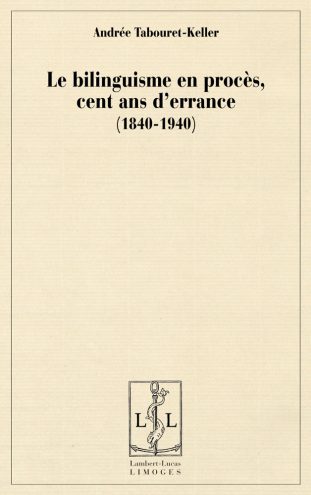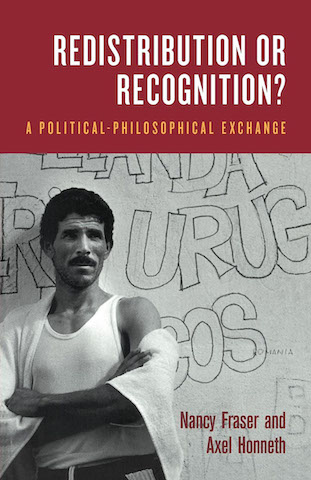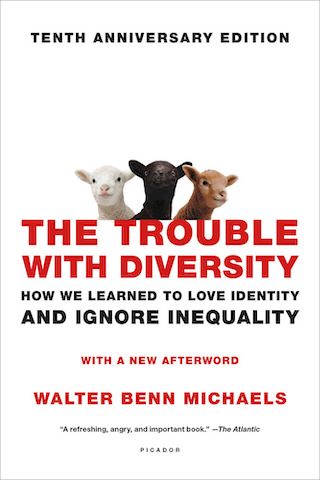In her book Le bilinguisme en procès, cent ans d’errance (1840–1940), Andrée Tabouret-Keller eloquently documents and analyzes how, from the mid-nineteenth to the mid-twentieth century, intellectuals, politicians, and academics in Western Europe have contributed to the stigmatizing and pathologizing of bilingualism, bilingual speakers, and bilingual education.1 Limoges, France: Lambert-Lucas, 2011More Info → At first glance, what she describes is at odds with the current academic discourse, which questions the superiority of monolingualism over multilingualism and recognizes the study of multilingualism as a legitimate scholarly enterprise. This apparent historical shift in perspective, however, deserves further examination. I aim to pinpoint a series of issues that force us to reconsider and problematize what could generally be considered as a sociolinguistic achievement, and thus challenge the idea that promoting multilingualism constitutes de facto an appropriate sociolinguistic response to the pervasive and undeterred monolingual mindset the discipline has combatted from its earliest stages.
Limoges, France: Lambert-Lucas, 2011More Info → At first glance, what she describes is at odds with the current academic discourse, which questions the superiority of monolingualism over multilingualism and recognizes the study of multilingualism as a legitimate scholarly enterprise. This apparent historical shift in perspective, however, deserves further examination. I aim to pinpoint a series of issues that force us to reconsider and problematize what could generally be considered as a sociolinguistic achievement, and thus challenge the idea that promoting multilingualism constitutes de facto an appropriate sociolinguistic response to the pervasive and undeterred monolingual mindset the discipline has combatted from its earliest stages.
Achievements
Sociolinguistics has a long tradition of positioning linguistic diversity as a major constitutive factor in human conduct and social organization. By moving away from a monoglot conception of language and language use, sociolinguists have clearly challenged attitudes regarding the supremacy of standard languages, monolingual language policy, and monolingual ideologies. Instead, scholars have postulated—from various and sometimes conflicting perspectives—that variation, languages in contact, and multilingual repertoires form a very “normal” component of human interactions and societal practices.
By shifting the perspective, the field of sociolinguistics has made a substantial contribution to elevating multilingualism as a legitimate object of scholarly inquiry and a legitimate social practice in both the academic and the political sphere (whose agendas, as we know, often overlap). Sociolinguists have furthermore engaged in producing national language policies that acknowledge the multilingual aspects of a nation’s citizens. Some scholars have been influential in the field of education, providing guidance for bilingual programs or for heritage language classes.2See for instance Colin Baker and Wayne E. Wright, Foundations of Bilingual Education and Bilingualism (Bristol, UK: Multilingual Matters, 2017) or Jean-Claude Beacco et al., Guide for the Development and Implementation of Curricula for Plurilingual and Intercultural Education (Council of Europe, 2016). Others have engaged in language revitalization processes by providing a multilingual approach to the matter.3Nancy H. Hornberger, “Multilingual Education Policy and Practice: Ten Certainties (Grounded in Indigenous Experience),” Language Teaching 42, no. 2 (2009): 197–211. For most of them, multilingualism promotes social justice, as they hold that injustice is located in the monolingual mindset.4Michael Clyne, “The Monolingual Mindset as an Impediment to the Development of Plurilingual Potential in Australia,” Sociolinguistic Studies 2, no. 3 (2008): 347–366. The importance of multilingualism studies in our field can also be measured by the proliferation of journals, handbooks, book series, research centers, and graduate programs on the subject. National and supranational entities (e.g., the European Commission, UNESCO, among others) have conducted large studies on multilingualism across the globe.
Far from being vilified, multilingualism is acknowledged and even celebrated, and academia has clearly contributed to this development. Many of the initial battles our predecessors fought in the belief that reclaiming multilingualism would lead to social justice and reduce inequality among speakers, citizens, and bodies appear to be paying off.
Complications
Nevertheless, this development deserves closer examination. As the “Sociolinguistic Frontiers” essay series has shown, knowledge production is inherently related to the particular moment in which it is produced. What initially appears to be a scholarly or political issue is deeply intertwined with our understanding of what we feel—or what we are taught to think—the problems of our time are.
“It seems to me that we should not be too quickly satisfied by the enthusiasm surrounding multilingualism, especially because this enthusiasm has concealed central problems that can no longer be ignored.”As Monica Heller demonstrates in her insightful analysis of the SSRC’s Committee on Sociolinguistics, what seems possible to discuss and what seems impossible or less likely to be articulated is tied to a particular historical moment. For multilingualism, the turn from a stigmatized to valued disciplinary approach should thus be critically examined under the particular conditions in which our knowledge is produced. It seems to me that we should not be too quickly satisfied by the enthusiasm surrounding multilingualism, especially because this enthusiasm has concealed central problems that can no longer be ignored. In contemporary society, multilingualism is simultaneously valued in terms of “market expansion,” “productivity,” or “creativity,” and it is framed as a potential resource that can be transformed into various forms of capital. In this context, academic work is mobilized and instrumentalized to support this narrative. We see advertisements lauding the advantages of multilingualism popping up in the realm of private schools; we observe attempts to introduce processes of language commodification in the contemporary globalized economy; we encounter advocacy movements that mobilize multilingualism as a viable approach to creating respectful societies; we see supranational institutions promoting multilingualism as a central means to achieve global citizenship. These enthusiastic and optimistic discourses assume that promoting multilingualism, celebrating it, and valuing it as a skill, a talent, and a property will generate benefits for the individual, the company, the community, the state, and society at large.
These discourses, however, remain silent on the power relations and social conditions that shape the idea of multilingualism as a desirable good. They tacitly erase the fact that language (multilingualism included) constitutes a central site for the production of social differences. These differences are a factor in creating a social hierarchy of speakers, conferring to some individuals or groups the profit of distinction while depriving others of symbolic and material resources. Hence, multilingualism is not neutral, but rather intrinsically embedded in social processes that inform who and what counts as a legitimate speaker, language, and practice. As such, multilingualism represents a site of struggle for access to and distribution of knowledge, resources, and status. Indeed, what constitutes desirable multilingual competence, a desirable multilingual speaker, and desirable or less desirable languages (or combinations thereof) is part of the political economy of linguistic exchange; these highly variable factors are dependent on history, context, and the market within the capitalistic, patriarchal, and colonial logic in which we operate.
It is clear that not every speaker and not every multilingual repertoire has the same value everywhere and at all times. Having Japanese in their language repertoire may help a manager get a better job in a multinational company, and being a multilingual speaker of French, German, English, and Italian in Switzerland may ease a tourism worker’s entry into the job market. But being fluent in Portuguese and Spanish in the very same country does not necessarily constitute an advantage; on the contrary, this particular multilingual repertoire can be easily constructed as problematic—even as a deficit—since it also implies class and racial differences. Moreover, certain multilingual competences are capitalized on in daily practice but are not officially acknowledged. For instance, a hotel maid may be asked to translate an email from a Polish client into French. Her language skills are a resource for the hotel, but she receives neither compensation nor any kind of reward in exchange.
Under our current conditions, we, as scholars, are forced to question what it means when multilingualism becomes the object of such appropriation, what it does to whom, and what consequences it has for our academic stance. Regarding the latter, we must also reflect on how far we may be complicit in both the enthusiasm and the erasure it entails. I believe these questions are important, because answering them could shed light on why we have grown so enthusiastic about multilingualism and what this enthusiasm might have erased while also providing insight into how we could reconsider our stance.
Why recognition is not enough
“Although she in no way considers the politics of recognition to be entirely pointless or always inadequate, Fraser nevertheless proposes that we think in terms of a ‘perspectivist dualism’ in the sense that it is necessary to think and act in terms of recognition and in terms of redistribution.”A large part of the problem with the enthusiasm of sociolinguists for multilingualism and our hopes that it could remedy problems surrounding linguistic disadvantages is that we subscribe, more or less consciously, to the idea that acknowledgement of linguistic diversity will foster social progress. We rely predominantly on a vision of social justice that takes the form of a politics of recognition, to use the locution coined by the German political philosopher Axel Honneth. We believe (believed) that appropriate recognition would lead to fair redistribution. Nancy Fraser notes that the social, intellectual, and political mobilizations we are currently witnessing, as well as the theoretical and political contributions regarding social justice produced since the 1970s, are dominated by the idea that inequalities very much rely on “spoiled” identities and the solution is for social justice to act on them.5 New York: Verso, 2003More Info → Fraser examines this trend by highlighting a series of issues. On the one hand, stressing recognition tends to erase the importance of redistribution, which was previously the key element in reading inequality and defining social justice. She furthermore points out how the emphasis on identity politics has supplanted questions of social class, emphasizing that an identity-based approach to social justice also induces/incites/encourages a form of competition among the identity groups, preventing logics of solidarity from forming. Although she in no way considers the politics of recognition to be entirely pointless or always inadequate, Fraser nevertheless proposes that we think in terms of a “perspectivist dualism” in the sense that it is necessary to think and act in terms of recognition and in terms of redistribution.
New York: Verso, 2003More Info → Fraser examines this trend by highlighting a series of issues. On the one hand, stressing recognition tends to erase the importance of redistribution, which was previously the key element in reading inequality and defining social justice. She furthermore points out how the emphasis on identity politics has supplanted questions of social class, emphasizing that an identity-based approach to social justice also induces/incites/encourages a form of competition among the identity groups, preventing logics of solidarity from forming. Although she in no way considers the politics of recognition to be entirely pointless or always inadequate, Fraser nevertheless proposes that we think in terms of a “perspectivist dualism” in the sense that it is necessary to think and act in terms of recognition and in terms of redistribution.
By adopting this dual perspective, Fraser once again positions the issue of political economy at the heart of social justice issues. This stance also allows her to challenge a certain psychological naivety found in our reasoning that the problem of social inequality would be solved by bringing recognition and legitimacy to “spoiled” identities. This approach reminds us of the importance of thinking in terms of intersectionality, as Black women intellectuals argued already at the end of the nineteenth century.6 New York: The New Press, 1995More Info → This implies action and transformation regarding both recognition and redistribution while also breaking down barriers between identities and neutralizing potential competition between identity groups. Finally, Fraser proposes that social justice be conceived in terms of parity of participation. Without taking into consideration the structural and material inequalities of certain citizens, the recognition of their cultural diversity will, in the end, lead only to a simulacrum of participation. Without the guarantee of material conditions for actual participation, recognition alone simply gives a symbolic voice to subaltern bodies.
New York: The New Press, 1995More Info → This implies action and transformation regarding both recognition and redistribution while also breaking down barriers between identities and neutralizing potential competition between identity groups. Finally, Fraser proposes that social justice be conceived in terms of parity of participation. Without taking into consideration the structural and material inequalities of certain citizens, the recognition of their cultural diversity will, in the end, lead only to a simulacrum of participation. Without the guarantee of material conditions for actual participation, recognition alone simply gives a symbolic voice to subaltern bodies.
The field of multilingualism studies and its political impetus is linked to this general understanding of recognition as a form of social justice. By valuing and promoting multilingualism, by believing that celebrating it can neutralize inequalities, academics have created new hierarchies and omitted, for instance, the monolingual experiences of the working classes. We have forgotten that multilingualism is also an ideological regime that produces difference and potential inequality. The embrace of multilingualism by current societies also reveals that our stance can be aligned with capitalistic interests. Multilingualism can also be aligned with nationalist7For example, see the work of Alfonso Del Percio on multilingualism as national propaganda. “Branding the Nation: Swiss Multilingualism and the Promotional Capitalization on National History under Late Capitalism,” Pragmatics and Society 7, no. 1 (2016): 82–103. and even (post)colonial and patriarchal interests, as Beatriz Lorente shows in regard to multilingual Filipino nannies.8Beatriz P. Lorente, Scripts of Servitude: Language, Labor Migration and Transnational Domestic Work (Bristol, UK: Multilingual Matters, 2017). Hence, multilingualism is not per se emancipatory for all: it can also produce and reproduce exploitation and domination. Perhaps we have learned to love multilingualism and to ignore inequalities, to paraphrase Walter Benn Michaels, even if we believed in good faith that we were contributing to positive social change.9 New York: Macmillan, 2006More Info → Indeed, by our very actions, we may have become complicit in the erasure of the complex processes at stake when it comes to language and equality. We may also have acted naïvely and at times irresponsibly by not fully taking into account the capitalistic, patriarchal, colonialist, and nationalist societies in which we operate.
New York: Macmillan, 2006More Info → Indeed, by our very actions, we may have become complicit in the erasure of the complex processes at stake when it comes to language and equality. We may also have acted naïvely and at times irresponsibly by not fully taking into account the capitalistic, patriarchal, colonialist, and nationalist societies in which we operate.
But if this diagnosis is correct, the question remains: What do we do about it? One possible step is reclaiming redistribution both as a central concern—in order to better understand what is happening on the ground—and as a possible explanation for the dilemmas we scholars face and that certain members of society experience in their daily lives. In doing so, we would be obliged to resist the insistent and persistent siren song of the celebratory discourse on multilingualism. Another approach would be to analyze how this recognition-redistribution dynamic unfolds and how it enables—or prevents—the emergence of new intersectional solidarities in which language plays a role. We could explore, engage with, and participate in other imaginaries that fight and/or try to escape the current social order in which we operate. But we must give up the idea that multilingualism is a necessary part of the solution to problems surrounding language and inequality. And this in turn implies we must fundamentally reconsider what can be viewed as an achievement.














